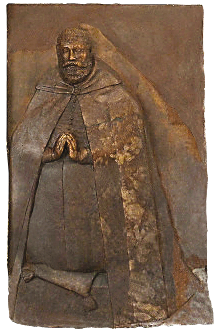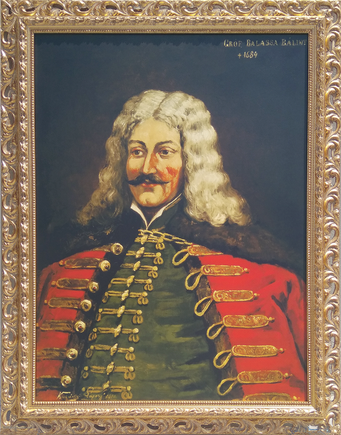FURTHER MEMBERS Descendants of František Balaša (1471 – 1526) in the Castle of Modrý Kameň | ||
ŽIGMUND BALAŠA (1572 – 1623) | ||
 | ||
After the line of Ján Balaša (1518 – 1577) died out with the death of his sons Valentín I. (1554 – 1594), František (1563 – 1594) and their descendants, Žigmund Balaša undertook the administration of the ancestral properties in Považská Bystrica and Modrý Kameň. He was a Royal Chamberlain, governor of Nograd County and Envoy of Hungarian nobility. He was a well-educated man and active in literature. After returning from his studies and scholarships abroad, he was appointed governor of Novohrad County. After the devastating Ottoman raids, he repaired the ancestral castles in Divín (1598) and Modrý Kameň (1609 – 1612). He rebuilt the Modrý Kameň castle in a Renaissance style. He participated in the anti-Habsburg uprisings of the nobility and for his alleged collaboration with the Ottomans he was accused of high treason. Consequently, the Modrý Kameň castle was encircled by the imperial army led by Captain Teufenbach and in 1616, Žigmund Balaša was captured and put in prison in the Bratislava Castle. Thus, he did not achieve his ambition to become the Count of Transylvania. He is buried in the church in Považská Bystrica. Žigmund Balaša Repairing the Modrý Kameň castle after the end of the 15-year war, thought of the ever-looming danger of the Ottoman raids. In the ravelin of the castle, he built major defence structures and dug out the castle ditch. During the preservational archaeological research in 2013, the foundations of the tower of the castle palace with an extremely thick walls of 3 to 4.5 m were revealed. The structure was named “Žigmund’s Tower”. | ||
VALENTÍN II. BALAŠA (1624 – 1684) | ||
 | ||
Son of Ondrej Balaša (1595 – 1649) and Mária Bakošová from Ožďany, grandson of Žigmund Balaša (1572 – 1623). He was born in the castle of Modrý Kameň in 1626. His mother died in childbirth. Being raised by the second wife of his father Helena Suňog, he led the cruel life of an orphan, and ultimately escaped to Trnava, where he was accepted by the Jesuits. They took care and taught him until his departure to the University of Vienna, where he achieved a remarkable level of education. In the period from 1651 – 1659, he became Knight of the Golden Spur and Chamberlain of the Emperor and King, Royal Advisor and Commander of the troops. In 1664, he defeated and chased the Ottomans out of Modrý Kameň, where he lived. In the same year, he led his troops against the Ottomans near Nitra and Levice. Subsequently he became the governor of Hont County and earned the title of a count. He became Captain of Modrý Kameň in 1665 and, in 1677 Captain of Krupina (1667 – 1682). In 1677, he became a Royal Judge. In 1679, he concluded his third marriage with Helena Eszterházy at the castle in Považská Bystrica. In 1658, he obtained from Emperor Leopold I the right to hold fairs for the little town in the precinct of the Modrý Kameň castle. He was also active in literature and wrote religious and amorous poetry, philosophical-political tracts and dramatic works. Known is his play about his gloomy childhood with the title of The Curse. | ||
Go to content
Back to content


